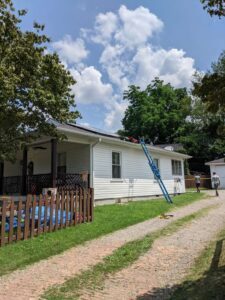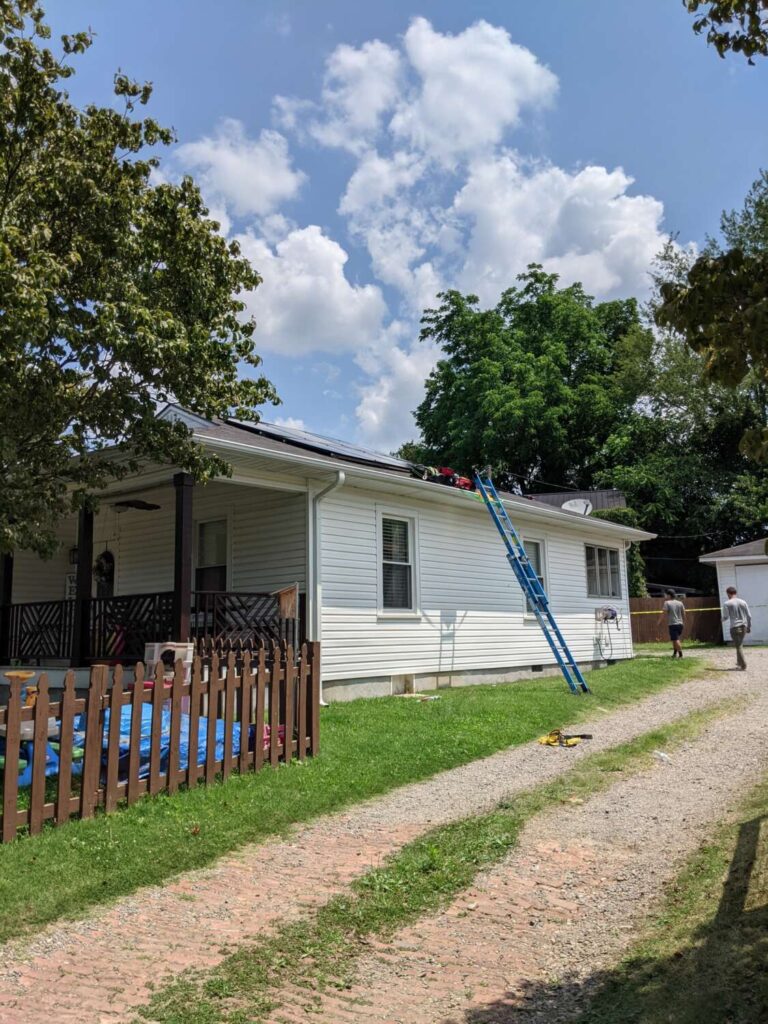In an effort to increase the region’s adoption of and access to affordable solar installations, a diverse coalition of Asheville and Buncombe County community members and mission-aligned organizations came together in 2021 to launch Solarize Asheville-Buncombe.
Solarize campaigns have been gaining popularity across the country with hundreds having taken place in the U.S. since the first one in Portland, Ore. in 2009. As limited-time group-purchase initiatives that strive to streamline and simplify the process of going solar, solarize campaigns are effective in expanding residential and commercial solar installations rapidly in a defined geographical area.
Solarize Asheville-Buncombe was the third solarize campaign Asheville and Buncombe County have seen, with the first two taking place in 2013 and 2015. On the heels of the City of Asheville and Buncombe County’s 2018 adoption of resolutions to transition the region to 100 percent renewable energy, the timing was ripe for another solarize campaign.
The Solarize Campaign
Solarize Asheville-Buncombe is led by a coalition consisting of Green Built Alliance, Blue Horizons Project, the City of Asheville, Buncombe County, MountainTrue, Hood Huggers International, Solar CrowdSource, Asheville Homestay Network, Sierra Club, Green Opportunities, and Umoja Collective.
This coalition first assembled in late 2020 to plan with a focus on prioritizing environmental justice and incorporating lessons learned from past campaigns. Key to this campaign were the goals of increasing affordability and access to solar for low- and moderate-income families as well as a workforce development program.
The Solarize Asheville-Buncombe campaign brought down the cost of solar for all participants thanks to bulk discounts on solar panels, batteries, and equipment, and reduced installer costs on marketing and lead generation.
The solar installers for residential and commercial installations were pre-selected via a competitive RFP process, and pricing was tiered, meaning that prices per watt installed went down as more participants signed contracts with the installer.
The campaign was wildly successful and surpassed all expectations. Just five weeks after launching in April 2021, the campaign reached its lowest residential pricing tier of $2.45 per watt of solar installed, which realized savings of 10 to 20 percent compared to non-campaign pricing.
By August 2021, Solarize Asheville-Buncombe had more than 700 sign-ups for free evaluations, 120 contracts signed, and more than one megawatt of solar committed to be installed. Once these systems are fully installed, the equivalent of more than 1.75 million pounds of carbon emissions — equal to 875 tons — will have been avoided in Buncombe County. Together, these systems comprise 2,626 solar panels that can produce 1.30 million kWh annually, will save these homeowners $168,275 yearly on their utility bills, and represent $3.05 million in new local clean-energy development.

The Neighbor to Neighbor Initiative
Too often, the economic and environmental benefits of residential solar are out of reach for families of low and moderate incomes. Solarize Asheville-Buncombe’s Neighbor to Neighbor program strove to offer solar installations free or deeply-discounted for families making below 100 percent of Buncombe County’s area median income (AMI).
Local data shows that Buncombe County’s communities of color, low-income families, and households in formerly redlined neighborhoods experience the greatest energy burden, meaning these households pay a disproportionate share of their already limited income on energy costs. Neighbor to Neighbor was designed to help alleviate the energy burden borne by these households and to move toward a more just and equitable clean energy future for Buncombe County.
As of August 2021, Neighbor to Neighbor had funded solar panel installations on the roofs of nine low- and moderate-income households. Eight of these were fully-funded, and one was partially-funded based on household income. In addition to income requirements, participating homes also had to meet criteria related to sun exposure and roof age.
By permanently reducing their utility costs through the solar installations, these households will have more money for crucial family expenses such as food and medication, and hopefully be less vulnerable to the effects of climate change moving forward.
Funding for these systems was provided by grants from the City of Asheville, Buncombe County, and individual donations. The program set a goal of serving 30 households by the end of the campaign, and was in the process of raising the remaining $115,000 needed to fund those systems as of August 2021.
Regardless of whether they receive solar installations, Neighbor to Neighbor participants are also referred to Energy Savers Network, a free energy-efficiency upgrade program housed at Green Built Alliance under the umbrella of Blue Horizons Project.
The results
The 2021 Solarize Asheville-Buncombe campaign demonstrated that this model does work to bring down the cost of solar for all participants, as it has in more than 350 municipalities in the U.S. in the past 15 years.
The innovative crowdfunding component of the Neighbor to Neighbor campaign raised more than $85,000 to deliver free or deeply-discounted solar to numerous low- and moderate-income households. This is something that had not previously been achieved locally.
Evidenced by the many donations from individuals in support of making solar available to low- and moderate-income families, this campaign energized the broader community around an opportunity to marry climate justice with more solar on more roofs in service of our community renewable energy goals.
“I’ve thought about solar for a very long time, did my research, but the prices were just out of my price range,” said Neighbor to Neighbor recipient Millicent Johnson of Weaverville. “Having solar means more money in my pocket, so I can do other things. … Words can’t even describe how grateful I am for this program.”
Sophie Mullinax manages Blue Horizons Project, a community-wide campaign to help residents and businesses of Buncombe County adopt energy efficiency and renewable energy. Before moving home to Asheville in 2018, she spent nine years working in the nonprofit sector while living in Washington, D.C. Connect with Sophie at bluehorizonsproject.com.
You can also view this article as it was originally published on page 50 of the 2021-22 edition of the directory.


